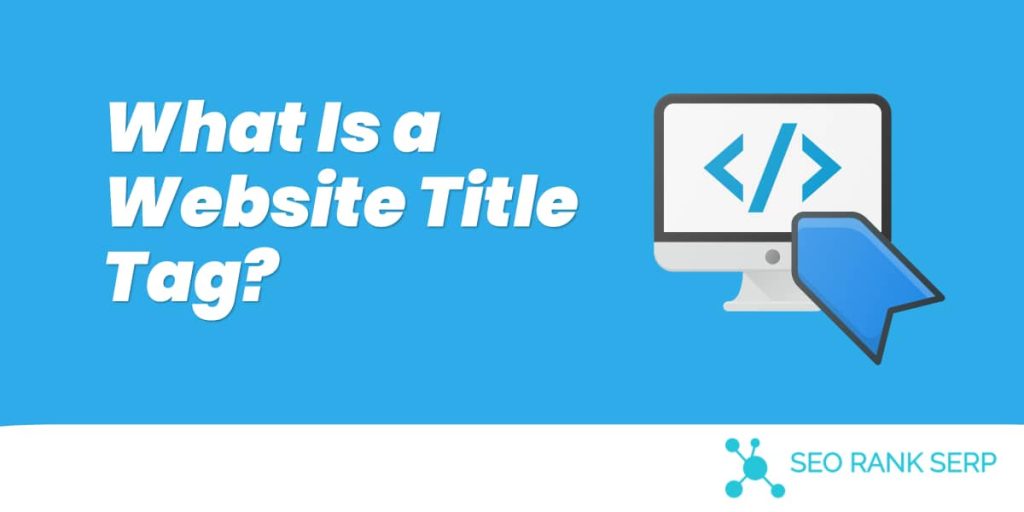What is a website title or title tag?
There are different definitions of website title on the web, and some of these definitions can be confusing. We understand how frustrating it is not getting the description of something when you genuinely need the full definition. This post has a simplified yet complete meaning of a title tag. So, what is a website title?
It is an HTML element that specifies the content of a webpage. This title is very helpful for both search engines and users. Search engines need the title to weigh the relevancy of a webpage, and this results in the content surfacing when the correct search query is keyed. On the other hand, internet users need a website title so they can see an accurate and brief description of a page’s content before clicking on a link in the SERPs.

The title tag
For search engines to recognize any website title added, you must enclose your title using the <tittle>…</tittle> tag. See the below example for more information.
<tittle>What is video SEO</tittle>
Where can you see the title tag?
There are various places where you can see the title tag. Let’s quickly have a look at the different places your website title appears.
- In your browser toolbar when you are on the actual site
- In your bookmarks if you have bookmarked the page
- On social networks when you share the link to that page
- In your browser when you right click your mouse and select inspect element or View page source. You can also use keyboard shortcuts ctrl + Shift + I and ctrl + U respectively.
How title tags work
Title tags play a significant role in ranking today and especially if looking to win in SEO. This, therefore, requires you to choose your titles well. Rushing to add any title that rings in your head is not the best way to go.
Luckily, there are guidelines that define what needs to be done for title tags to be included in the right manner. Now, in case of a query, search engine bot crawlers will first detect the site’s HTML <head> element to understand what your content is about. If your title tag is accurately and correctly added, your content pops up. If not search engine bot crawlers try to generate an improved title from other sources, like anchors or on-page text.
Title tag best practices
While you may have the freedom to add title tags as you wish, it is significant to follow some of the proven ways of solving title tags dilemmas. Why even attempt to make a mistake while there are tried and tested ways of solving concerns that exist? See the below tips before proceeding to create or edit your website titles.
- Keep it short: Ideally under 55 characters. 70 characters are the maximum amount of characters that will display in the search results. Other characters past the maximum amount will be truncate, and ellipsis added indicating your title tag has been shortened.
- Don’t use caps: Consider capitalizing every word you include. You can as well use sentence case to format your title.
- Avoid keywords stuffing in the title: For instance, don’t title your piece, “What Is Marketing? Marketing Tips, Marketing Facts, Marketing General Information.”
- Write compelling copy that would make you want to click on the link: Make sure your content is more appealing than the title tags. Doing so, you will trigger even those contemplating to navigate away to click the link.
- Make it relevant to the page itself: Avoid adding title tags without considering the relevance of the title to the page. Consider even reviewing the page before including your title tags.
- Make your <h2> keywords different from the title tag: This is very crucial to enhance user experience and ranking.
- Include your brand in the title: For example, “Best Digital Agencies – Lawiih Tech.” Adding brand names in the tile is a good practice. For small businesses, it is best when the brand name is added at the end of the title tag. While for established businesses, at the beginning of page titles.
- Place significant keywords close to the front of the title tag: The closer to the beginning of the title tag a keyword is, the more helpful it will be for ranking. Additionally, the more likely a user will be to click them in the search results.
Conclusion
The relevancy of title tags in ranking and marketing is, without a doubt, significant. You do everything right, and you have a reason to smile. Otherwise, you will have only yourself to blame. Do you have anything about website titles you want to get out of your chest? Now it the right time to let us know. We are ready to give you our ears.

Jay
I've worked for WooRank, SEOptimer, and working on a cool SEO audit tool called SiteGuru.co. Now I have build Linkilo and SEO RANK SERP WordPress theme. I've been in the SEO industry for more than 5 years, learning from the ground up. I've worked on many startups, but also have my own affiliate sites.
TRY OUR FULLY SEO-OPTIMIZED WORDPRESS THEME FOR AFFILIATE MARKETERS!
No need to hire SEO experts anymore to fix your site technical SEO issues
IMPROVE YOUR SITES RANKING TODAY